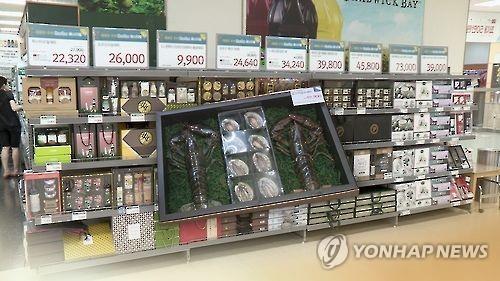South Korea is considering easing an anti-corruption law by raising the cap on the values of free meals, sources said Wednesday, amid criticism that it adversely impacts consumer spending.
The law currently bans those working in government, media and schools from receiving free meals priced higher than 30,000 won ($25), gifts exceeding 50,000 won, and congratulatory and condolence money over 100,000 won.
 |
An image of gift boxes of fishery goods sold at a local department store (Yonhap) |
The government is considering changing the price limit on meals to 50,000 won, the source said.
The government aims to revise the enforcement ordinance of the so-called the Kim Young-ran Law in March after after analyzing the result of studies, commissioned by the Ministry of Agriculture, Food and Rural Affairs, the Ministry of Oceans and Fisheries, and the Small and Medium Business Administration, on the economic impact of the anti-graft law, which took effect in September.
While some lawmakers claim the revision should be made before the Lunar New Year holiday next week, the government said it needs time for legal procedures to officially make the amendment.
Sources said the government is skeptical of proposals to exclude agricultural, livestock and fishery goods from the law during national holidays, as such a measure could discriminate against other industries and be exploited to give bribes. (Yonhap)








![[Today’s K-pop] Blackpink’s Jennie, Lisa invited to Coachella as solo acts](http://res.heraldm.com/phpwas/restmb_idxmake.php?idx=644&simg=/content/image/2024/11/21/20241121050099_0.jpg)